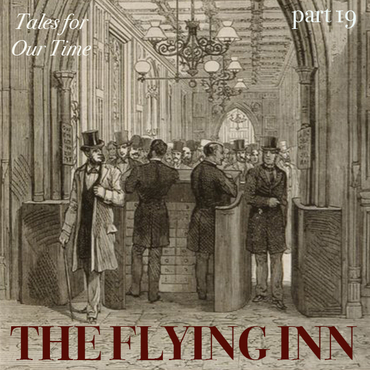Programming note: Tomorrow, Wednesday, I'll be hosting another edition of our Clubland Q&A taking questions from Steyn Clubbers live around the planet at 3pm North American Eastern - that's 8pm British Summer Time/9pm Central European.
~Thank you for all your kind comments on this latest Tale for Our Time. Tim Neilson, a First Weekend Founding Member of The Mark Steyn Club, was struck by this observation by G K Chesterton from Sunday:
And most people of modern, or rather of very recent times got all their notions of history from dipping into historical novels.
To which Tim adds:
Update to "social media and Netflix dramatisations", and qualify it by adding that most people have very few notions of history indeed (and mostly erroneous ones) and he could have been writing in 2024.
It's remarkable how much of the work of authors like Chesterton, CS Lewis et hoc generis remains pertinent today. I think it's because they weren't consciously trying to be 'modern' in their thinking. As Lewis remarked, the more up to date something is, the more quickly it goes out of date.
Very true, although being "up to date" is not a problem I've ever had.
That said, here we go with Episode Nineteen of Chesterton's novel of 1914: The Flying Inn. In tonight's episode a somewhat disengaged backbencher swings by the House of Commons to sleep off the rigours off the afternoon, and fails to recognise his prime minister or basic parliamentary procedures. Those were the days:
Dorian Wimpole had softly risen to go, when he was arrested by the sight of someone sliding into the House and handing a note to the solitary young man with heavy eyelids who was at that moment governing all England from the Treasury Bench. Seeing him go out, Dorian had a sickening sweetness of hope (as he might have said in his earlier poems), that something intelligible might happen after all, and followed him out almost with alacrity.
The solitary and sleepy governor of Great Britain went down into the lower crypts of its temple of freedom and turned into an apartment where Wimpole was astonished to see his cousin Ivywood sitting at a little table with a large crutch leaning beside him, as serene as Long John Silver. The young man with the heavy eyelids sat down opposite him and they had a conversation which Wimpole, of course, did not hear. He withdrew into an adjoining room where he managed to procure coffee and a liqueur; an excellent liqueur which he had forgotten and of which he had more than one glass...
The only thing that seemed to him queer was that every now and then a bell rang in several rooms at once. And whenever the bell rang, Lord Ivywood nodded, as if he were part of the electrical machinery. And whenever Lord Ivywood nodded the young man turned and sped upstairs like a mountaineer, returning in a short time to resume the conversation. On the third occasion the poet began to observe that many others from the other rooms could be heard running upstairs at the sound of this bell, and returning with the slightly less rapid step which expresses relief after a duty done. Yet did he not know that this duty was Representative Government; and that it is thus that the cry of Cumberland or Cornwall can come to the ears of an English King.
Apparently not. Members of The Mark Steyn Club can hear me read Part Nineteen of The Flying Inn simply by clicking here and logging-in. Earlier episodes can be found here.
We're now well into our eighth season of Tales for Our Time and have built up quite an archive. So, if you've a chum who's a fan of classic fiction in audio form, don't forget the perfect present: a Mark Steyn Club gift membership.
Please join me tomorrow both for Clubland Q&A and for Part Twenty of The Flying Inn.
























